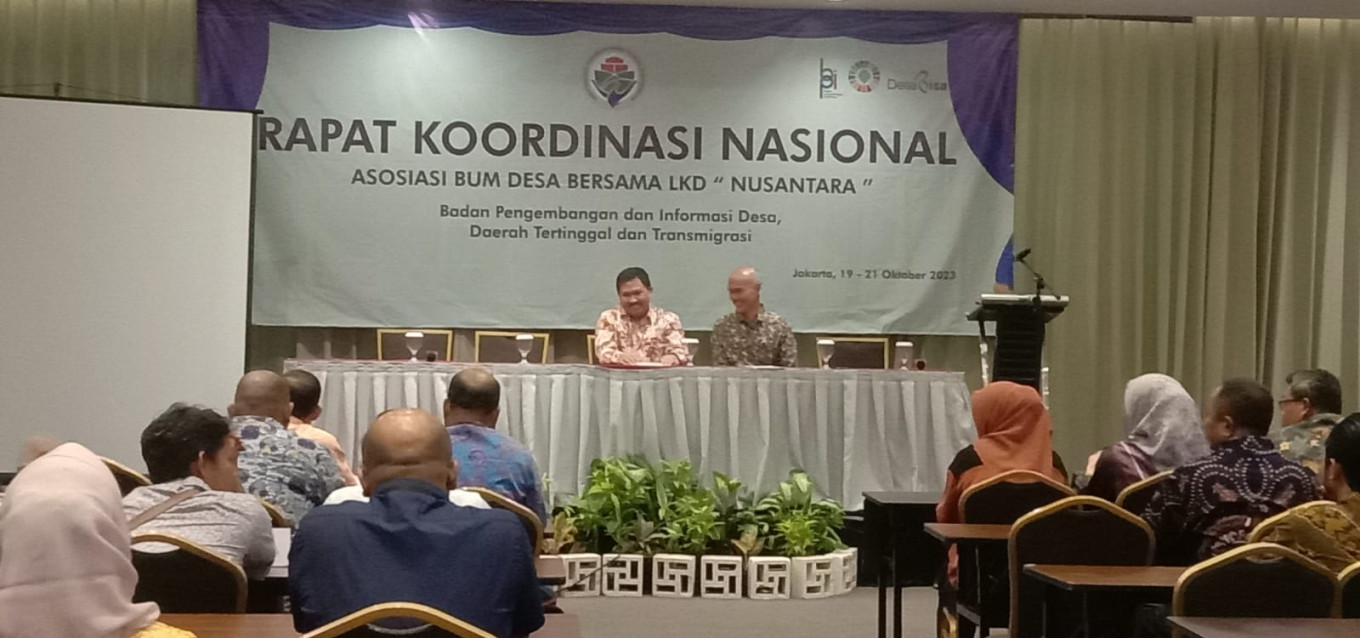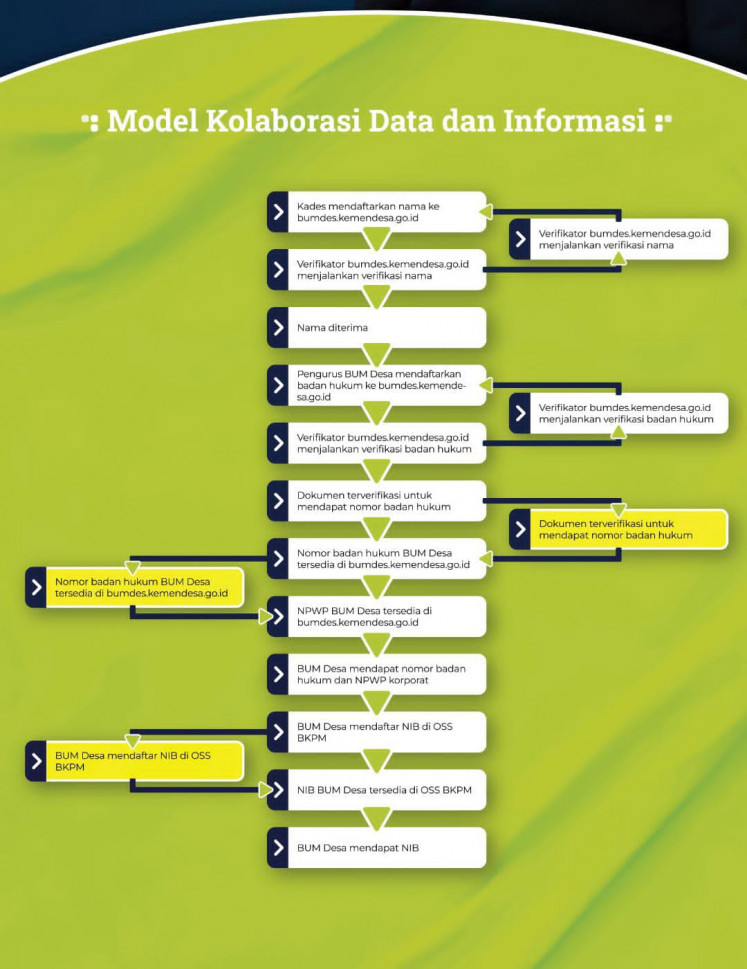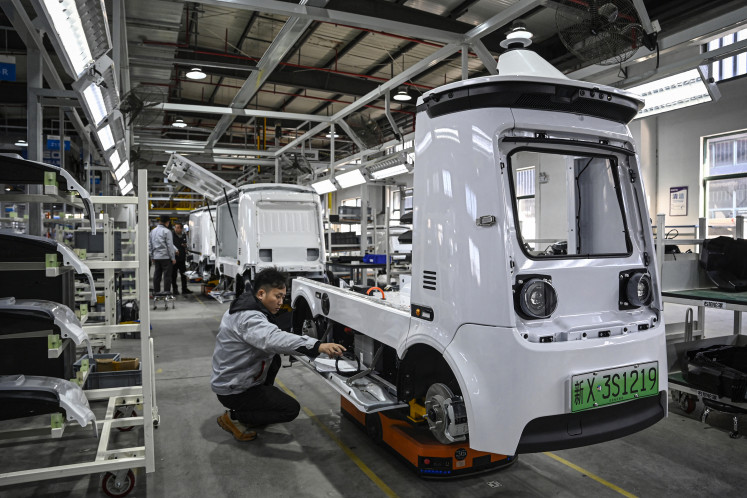Popular Reads
Top Results
Can't find what you're looking for?
View all search resultsPopular Reads
Top Results
Can't find what you're looking for?
View all search resultsBUM Desa data interoperability hastens village prosperity
After a grueling pandemic that caused global economic disruptions, Indonesia experienced an increase of 4.94 percent in economic growth in the third quarter of 2023, an increase of 1.60 percent compared to the second quarter.
Change text size
Gift Premium Articles
to Anyone
A
fter a grueling pandemic that caused global economic disruptions, Indonesia experienced an increase of 4.94 percent in economic growth in the third quarter of 2023, an increase of 1.60 percent compared to the second quarter. This is a promising trend, showcasing the archipelago’s economic recovery.
However, economic growth must extend beyond urban areas, and must be felt in villages across the country to ensure equal development. Thus, a revival of village-owned enterprises (BUM Desa) is essential to increase rural employment and income.
The rise of BUM Desa
The recently issued Law No. 19/2023 on the 2024 state budget (APBN) stipulated that Rp 71 trillion (US$ 4.57 billion) of village funds (Dana Desa) must be spent specifically for the revival of BUM Desa through capital expenditure.
It is estimated that BUM Desa capital will increase from Rp 55.1 billion in 2023 to Rp 3.1 trillion in 2024, in line with the efforts of 62,051 villages that own BUM Desa. Once all 75,265 villages deposit additional capital of Rp 100 million each, the number will reach Rp 7.5 trillion.
BUM Desa was born out of Law No. 22/1999 on regional government. Its position in the village is strengthened through Law No. 6/2014 concerning villages, namely as a business entity that can be formed by the village government.
Currently, Law 6/2023 on job creation and its derivative regulations have opened up wider business opportunities for BUM Desa, even beyond the authority of village governments.
Government Regulation No. 11/2021 concerning village-owned enterprises has made it easier to establish business collaborations with other parties. Meanwhile, Government Regulation No. 5/2021 created business opportunities for BUM Desa for the use of water resources and the utilization of toll and non-toll road sections, and Government Regulation No. 19/2021 allows ownership of buildings and land by BUM Desa.
In addition, Government Regulation No. 23/2021 opened business opportunities for the use of forest areas, forest product processing businesses and small-scale log processing, and Government Regulation No. 29/2021 allows the management of traditional markets. Lastly, Government Regulation No. 30/2021 spurs cooperation in motor vehicle testing and terminal management.
Details of all 25 BUM Desa regulations have been made available by the Villages, Disadvantaged Regions and Transmigration Ministry through the website https://bumdes.kemendesa.go.id.
Data interoperability
In order to guide villages through the new regulations, the interoperability of BUM Desa data and information is centralized on the BUM Desa website. Data interoperability is done in collaboration with the Law and Human Rights Ministry, the Investment Coordinating Board (BKPM), the Directorate General of Taxes, the Finance Ministry and the National Public Procurement Agency (LKPP).
The Villages, Disadvantaged Regions and Transmigration Ministry has trained village assistants, specifically regarding strengthening BUM Desa institutions. Following their training, the assistants accompany prospective BUM Desa administrators to begin the steps to validate the name of their enterprises.
First, a special village meeting will be held to establish a BUM Desa or replace the previous management. Then, the village chief will register the BUM Desa to obtain name approval from the village ministry.
Internally, the ministry itself will hold training sessions for verifiers, whose role is to be a special notary for the registration of BUM Desa. When there is a problematic name (similar names or those with negative connotations), the verifier will ask the relevant BUM Desa to change the name.
After the BUM Desa name has been approved by the ministry, the BUM Desa management, accompanied by the village assistants, will prepare all the administrative documents needed for registration of a legal entity, such as articles of association, bylaws, standard operating procedures, work plans and business plans. All documents will be presented at a special village meeting for legal entity registration.
The BUM Desa management then continues the name validation process for legal entity registration. When the verifier finds documents that are incomplete, the materials are returned to be corrected, after which the BUM Village administrator can upload them again, to be approved by the verifier.
Once the verifier declares that a BUM Desa is worthy of obtaining a legal entity number, data interoperability with the Law and Human Rights Ministry takes place, resulting in a BUM Desa legal entity document. Furthermore, data interoperability with the Directorate General of Taxes generates a corporate tax identification number (NPWP) for BUM Desa. These two documents are stored on the BUM Desa website, which can be downloaded by the BUM Desa.
Following the issuance of the documents, the BUM Desa will register with the Online Submission System at the Investment Coordinating Board (OSS-BKPM) for further data interoperability. After all data has been verified electronically, the OSS-BKPM will issue the business identification number (NIB) for the BUM Desa.
To make it easier for villages to access the benefits of data interoperability, a manual is also available on the BUM Desa website, which was prepared jointly by the Law and Human Rights Ministry, the BKPM, the Directorate General of Taxes and the LKPP. A manual and application for BUM Desa financial reporting is also provided, so that the report can be audited by a public accountant in the following year.
This article was published in collaboration with Ministry of Village, Development of Disadvantaged Regions and Transmigration












